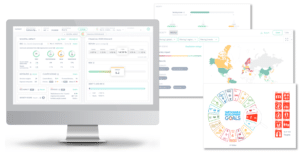

Rebeca Minguela, founder and chief executive of Clarity AI, launched the fintech that uses artificial intelligence and machine learning to allow investors to quantify the impact of their portfolios in 2017, and has received investments from BlackRock and Deutsche Börse in the last four months.
This month BlackRock announced a minority investment in Clarity AI and the asset manager said it will integrate Clarity AI’s capabilities into Aladdin, its end-to-end operating system for investment professionals.

Rebeca Minguela, Clarity AI
Minguela told Markets Media: “The process began when BlackRock clients who were already using our platform asked BlackRock if they could access our data through Aladdin to have everything in one place. I am really excited to partner with BlackRock as there is so much demand, but also so much confusion.”
Laurence Fink, chairman and chief executive of BlackRock, said in the results this month that the firm manages $200bn (€165bn) in sustainable assets and he expects this to grow to $1 trillion by the end of this decade.
Clarity AI uses algorithms to provide forward looking analysis of impact across more than 30,000 companies who have issued equity or debt, spanning almost 200 countries. This analysis complements traditional corporate environmental, social and governance disclosures.

Mary-Catherine Lader, BlackRock
Mary-Catherine Lader, head of Aladdin Sustainability at BlackRock, said in a statement: “Investors are galvanized around sustainability as a critical consideration in managing immediate and future risks, and better data is foundational to this. Clarity AI’s capabilities use machine learning to help Aladdin clients analyze a broader universe of companies, address their disclosure obligations and build more sustainable portfolios.”
Minguela said her interest in quantitatively measuring impact goes back to 2010 when she was at Harvard Business School, but at that time there was little available data. In 2016 she began to develop a prototype for Clarity AI and launched the firm the following year.
She previously led the global digital transformation program at Spain’s Santander Bank after founding Blink Booking, a last-minute hotel booking app that was acquired by Groupon in 2013. Minguela has also worked at Bain Capital Private Equity, Boston Consulting Group, German Aerospace Agency, Siemens and IBM.
“I wanted to focus on impact which is broader than ESG,” she explained. “Sustainability has also traditionally been linked to risk mitigation and we added non-financial metrics to bring another dimension.”

Clarity platform
Clarity AI uses machine learning and artificial intelligence to gather data and model its own estimates of impact, while providing as much transparency as possible.
“That is why we are called Clarity,” added Minguela. “We empower investors with tools so they can use our model or use the data to form their own views.”
The model includes unstructured data such as social media and news. The firm is also assessing how to use alternative data such as satellite imagery.
“It is a challenge to link the imagery to specific companies and we need to assess reliability,” Minguela said.
Funding
In October last year Clarity AI closed a $15m funding round led by Deutsche Börse and co-investor Mundi Ventures. The German exchange operator has a subsidiary, Qontigo, which provides indices and analytics.
Clarity AI announced today that it has closed a USD $15 million funding round led by Deutsche Börse AG and co-investor Mundi Ventures. Learn more: https://t.co/A5EEyLeush pic.twitter.com/Li2w6u26Ef
— Qontigo (@Qontigofinance) October 29, 2020
Minguela said the funding round and the investment from BlackRock allows Clarity AI to target a broader audience.
“We will keep investing in our technology and algos and recruit specialist talent such as data scientists,” she added. “We will also focus on business development Asia and Latin America, as we have previously grown in Europe and the US.”
She expects the growth in sustainable investing and the demand for data to continue.
“The increase in demand is not just due to regulation but because of expectations from the end-consumer,” Minguela said. “There will an increased focus on impact as well as mitigating risk.”





